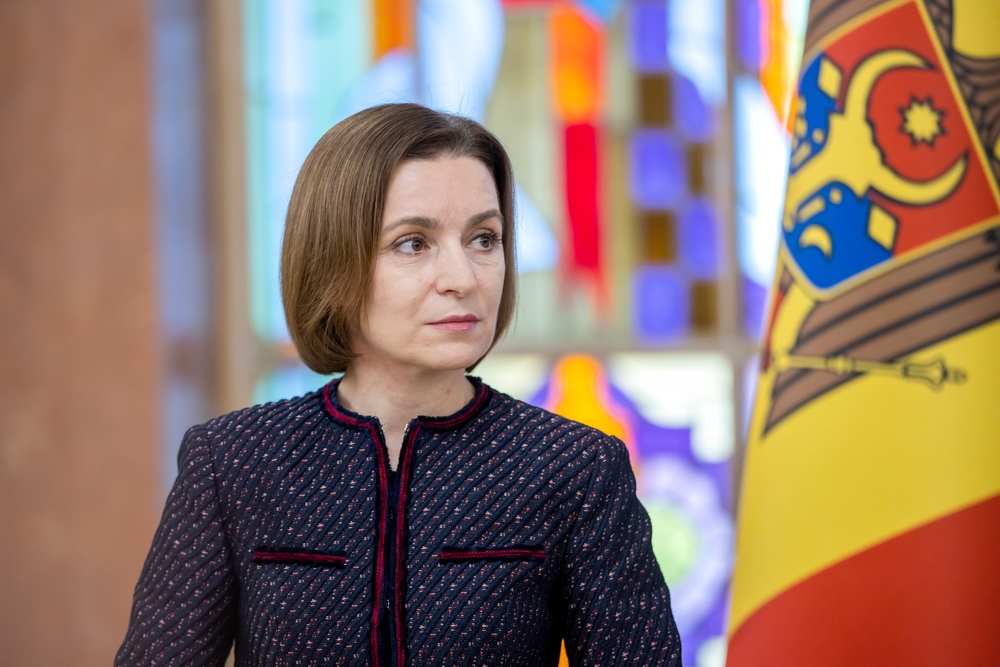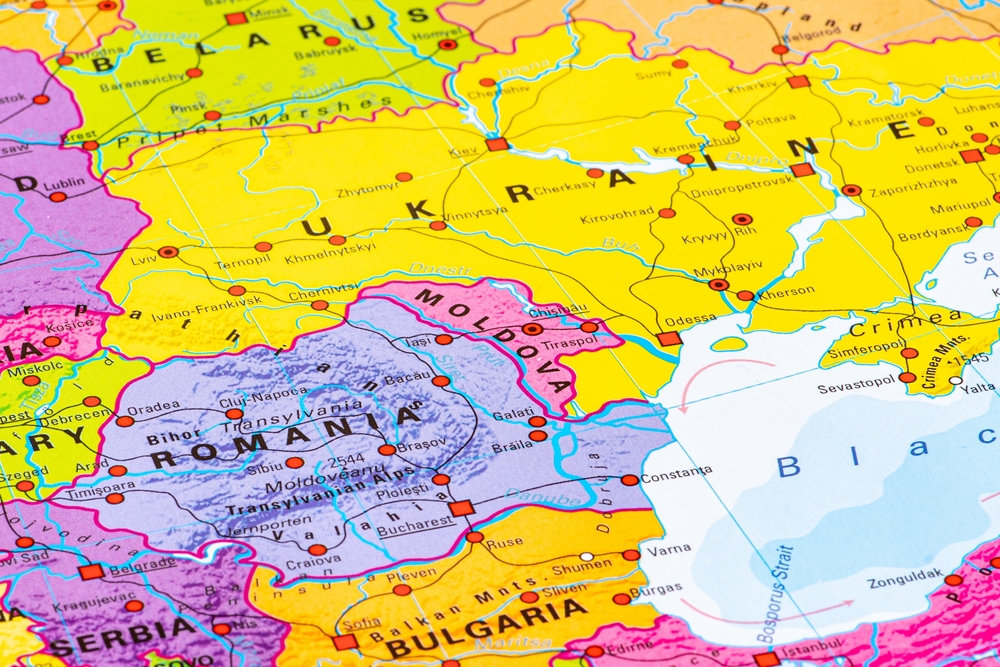La presidente modava Maia Sandu© Dan Morar/Shutterstock
The internal political crisis and pressure from Moscow have recently brought attention to Moldova. However, trying to interpret the situation in Ukrainian categories risks being misleading. The Moldavian situation has some peculiarities that need to be analyzed with precision
On February 21, the President of the Russian Federation Vladimir Putin canceled a treaty of 7 May 2012, in which Moscow outlined its foreign policy strategies and plans. The cancellation caused a stir because the aforementioned document, among other things, contained a very clear passage regarding Russian-Moldovan relations. These are the words: “[la Federazione russa intende] continue its active participation in the search for a solution to the Transnistrian problem, based on respect for the sovereignty, territorial integrity and neutrality of Moldova”.
The cancellation therefore suggested an official Russian disavowal of the sovereignty of Chișinău, thus fearing the risk of a scenario similar to the Ukrainian one. The news comes after extremely turbulent days for Moldovan politics. Earlier this month the Ukrainian president Volodomyr Zelensky had revealed the existence of a Russian plan – discovered by the secret services of Kyiv – to subvert the established order in Moldavia; plan also confirmed by the President of the Republic Maia Sandu. A few days later, Prime Minister Natalia Gavrilița resigned, claiming she did not have the necessary support to continue government action. Maia Sandu then appointed a new premier, Dorin Recean, secretary of the Supreme Security Council.
The political crisis and Putin’s recent demonstration have thrown the spotlight on Moldova, which is beginning to be seen as a new possible hot front in the Ukrainian conflict. Trying to interpret Moldova in Ukrainian categories, however, risks being misleading. The Moldavian situation has some peculiarities that need to be analyzed with precision.
Russian plans to destabilize Moldova
On February 13, President Maia Sandu confirmed what Zelensky had already revealed, ie the existence of a deliberate plan by Moscow to replace the leaders of the Moldovan executive power.
Sandu spoke of some actions thwarted last fall by the security services, which would have seen local political and military groups traditionally close to the Kremlin as protagonists; in addition to some army veterans, Sandu mentioned the powerful businessman Ilan Șor (founder of a party that bears his name, now outlawed), as well as men close to the powerful oligarch and former politician Vladimir Plahotniuc.
Șor was convicted of fraud in the first instance, but managed to flee Moldova and is now in his nationality of Israel. Despite his escape, his party continues to enjoy significant support, especially in central Moldavia, around the district of Orhei, a city where Șor was mayor.
Sandu also claimed that he had received detailed plans from the Ukrainian secret services to facilitate the entry of Serbian and Montenegrin citizens into Moldova, who were supposed to act as elements of disturbance and agitation. According to Sandu, “through violent actions disguised as protests by the so-called oppositions, an attempt would be made to force a regime change ”.
Last Sunday, a demonstration organized by the Șor party and other pro-Russian groups arrived in support of presidential fears. The event, however, did not create real public order problems: a few thousand people gathered in the center of the capital, limiting themselves to chant choirs against President Sandu and new Prime Minister Dorin Recean. The previous day, the police arrested 8 people, close to organized crime circles, who are believed to have illegally financed Ilan Șor’s party.
These disturbing actions which, according to Sandu, are sponsored by the Kremlin, are (still) devoid of that narrative outline of victimhood with an ethnic-linguistic background which instead characterized the months and years preceding the invasion of Ukraine. The claims against the president and her government loudly shouted even by the few demonstrators last Sunday are mostly of an economic nature; not surprisingly, one of the most shouted slogans by the demonstrators invited Prime Minister Recean to pay the exorbitant gas bills. The protesters were mostly people originally from Orhei district, the electoral fiefdom of Sor. It is unclear whether they received additional money and promises to reach the capital.
After the demonstration was resolved with almost nothing, the media attention returned to Transnistria, that strip of land that legally belongs to Moldova but is in fact governed by a self-proclaimed independent government.
The question everyone is asking is: can Transnistria become the Moldovan Donbass?
The situation in Transnistria is, however, different from that in Donbass. The latter was an integral part of the Ukrainian state until 2014, subsequently becoming the main object of confrontation (along with Crimea) between Kyiv and Moscow.
On the other hand, Moldova has never tried to take back Transnistria by force, often showing itself open to dialogue with Moscow to seek a solution that is as shared as possible, as demonstrated by the aforementioned 2012 document recently canceled by Putin. The peculiar situation experienced today in Tiraspol and in the rest of the self-styled independent republic is very different from that of Donbass in 2014.
Consequently, rather than as a pretext for a subsequent invasion of Moldova, Transnistria should be seen as a pawn in the wider chessboard of the ongoing conflict. Yesterday morning (February 23) in Chișinău there was an insistent rumor (probably stirred up by Moscow) of a probable Ukrainian invasion of Transnistria; a voice so insistent as to push the Moldovan executive to deny it categorically.
That Russia can therefore use Tiraspol as a diversion is not a far-fetched hypothesis. According to some American analysts, Moscow could open a front in the independent republic precisely for distract the Ukrainians , forcing them to deploy troops to the south to divert them from the eastern battles. However, this is a scenario that cannot be implemented immediately.
The new government
Much has been speculated about the resignation of Prime Minister Natalia Gavrilița, which came a few days after Zelensky’s revelation of Russian plans to destabilize Moldova. Gavrilița is, to this day, the vice-president of PAS (Action and Solidarity Party), the political formation of President Maia Sandu, to whom Gavrilița is very close and with which she shares pro-Western positions.
According to some authoritative local media, there is a feud behind his choice entirely internal to PAS , which ultimately saw her succumb. Gavrilița was appointed prime minister in August 2021, with a government agenda that targeted the fight against corruption and the country’s economic growth (Gavrilița herself had already served as finance minister).
The Russian aggression in Ukraine has completely subverted the priorities of the executive in Chișinău, which has found itself having to manage a huge wave of refugees, and continuous threats of destabilization from Moscow. According to data from the Moldovan Interior Ministry, about 600,000 Ukrainians have passed through Moldova since the beginning of the conflict, and currently about 100,000 remain in the country.
Probably, Gavrilița, already at the center of a series of controversies related to cases of tax evasion , was no longer considered suitable to manage the changed international-political climate. That behind the resignation there may be a “mere” internal PAS negotiation on future positions is also demonstrated by a recent appearance by the former prime minister who, answering questions from journalists, declared that he had various options open for his future, including which the candidacy for mayor from Chisinau.
The new chief executive, Dorin Recean, comes from the intelligence services environments, of which he knows all the working mechanisms. He is therefore a more suitable figure also to cement the front of the majority, in such a hot and tense moment.
The role of Romania
Yesterday, 23 February, Maia Sandu went to Bucharest where she met her Romanian counterpart Klaus Iohannis. The latter reiterated Romania’s total support for Moldova and, above all, reiterated support in the energy sector, essential to making Chișinău less vulnerable to pressure from Moscow. For a year, Romania has been supplying gas and electricity to its north-eastern neighbour, for some time now subjected to blackmail by Gazprom.
Romania continues to be Moldova’s main sponsor on its path to European accession.
Have you thought about a subscription to OBC Transeuropa? You will support our work and receive preview articles and more content. Subscribe to OBCT!


